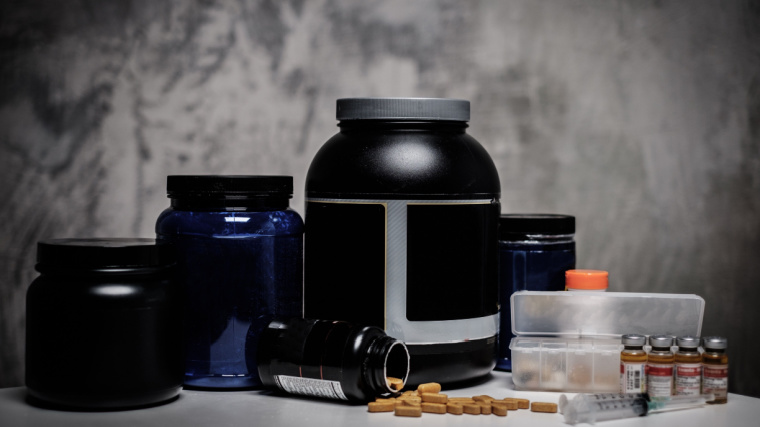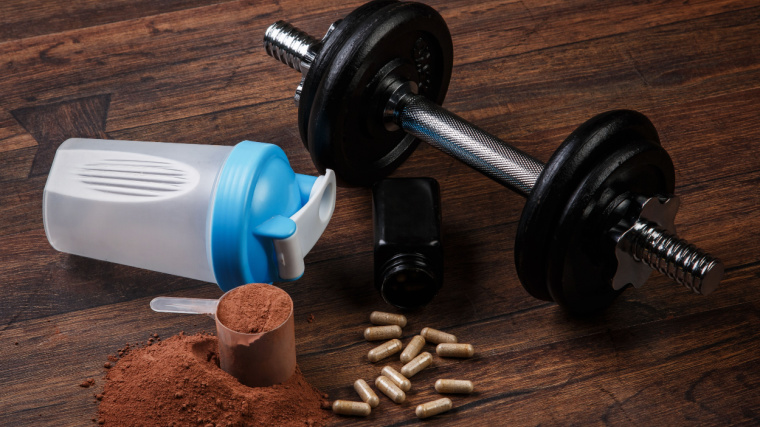You’re crushing your training program week after week, getting stronger, eating well, and sleeping like a baby. But after a while, you hit a plateau, and progress stalls. It might be time to consider taking a pre-workout supplement to take it to the next level. Pre-workout supplements are a blend of ingredients designed to improve your exercise performance.
If you’ve found yourself in the supplement aisle, you’ve faced endless options from various brands. They all offer slightly different blends of common pre-workout ingredients. Two major categories are non-stim pre-workout and stim pre-workout. “Stim” refers to stimulants and lets you know if the product has a stimulant (typically caffeine) in it or not.

Here, we’ll explain the differences in the dilemma of choosing between non-stim versus stim pre-workout supplements. We’ll discuss the ingredients in each and the pros and cons of choosing one over the other. Depending on your fitness goals and preferences, one may be a better fit — here’s what you need to help you find the best pre-workout for you.
- What Is Non-Stim Pre-Workout?
- What Is Stim Pre-Workout?
- Can You Take Non-Stim and Stim Pre-Workout Together?
- Frequently Asked Questions
What Is Non-Stim Pre-Workout?
Pre-workout is a dietary supplement in powder, drink, gummy, or capsule form. Bodybuilders made pre-workout products popular back in the 1990s, and they’ve stayed big on the market since. Gymgoers often enjoy pre-workout because it may help them feel more energized and focused to improve their athletic performance.

[Read More: Strongest Pre-Workouts]
Non-stim pre-workout supplements refer to pre-workout supplements without caffeine or other stimulants.
Common Ingredients
A 2019 analysis was done on the most common ingredients in the top 100 selling pre-workout supplements. They were beta-alanine, caffeine, l-citrulline, tyrosine, taurine, and creatine. The analysis notes that some products offer proprietary blends and don’t list the individual ingredients. (1)
Stim-free pre-workout doesn’t include caffeine but may also contain betaine, branched-chain amino acids (BCAAs), l-arginine, B vitamins, and other ingredients.
Beta-alanine
Beta-alanine is an amino acid that helps clear out lactic acid buildup in your muscles, which may reduce fatigue. Beta-alanine is a precursor to carnosine, an amino acid that plays a role in clearing lactic acid while you train. (2)(3)
Betaine
Betaine is an amino acid found in foods and pre-workout supplements. Research shows it may increase power output and muscular endurance. It may also help with muscle growth when paired with resistance training and proper nutrition. (4)(5)(6)
Branched-Chain Amino Acids (BCAAs)
BCAAs, or branched-chain amino acids, are three essential amino acids you need to build muscle. They include leucine (a precursor to muscle protein synthesis), valine, and isoleucine. BCAA supplements are popular on their own and are often found in pre-workout supplements. They may help with muscle growth, muscle recovery, and reducing soreness. (7)(8)
Creatine
Creatine is an amino acid that increases your stored energy (adenosine triphosphate, or ATP), leading to better muscular contractions.
It may improve your athletic performance in short-duration, high-intensity exercises like sprinting and weightlifting. (9)(10)
Nitric Oxide Boosters
Pre-workout supplements often contain the amino acids L-arginine and L-citrulline or citrulline malate. L-citrulline is a precursor to L-arginine, and L-arginine is a precursor to nitric oxide — both are nitric oxide boosters. Nitric oxide improves vasodilation, which increases blood flow and can lead to better pumps. It may improve strength and power output. (11)
Pros of Non-Stim Pre-Workout
Stimulant-free pre-workout may not give you the same energy boost as caffeine. It still packs other potentially performance-boosting ingredients without the crash.
No Caffeine Side Effects
The main difference between non-stim and stim pre-workout is the presence of caffeine. Without it, you don’t risk experiencing caffeine side effects. These may include a jittery feeling, anxiety, headaches, an excessively high heart rate, restlessness, and insomnia. (12)

[Read More: Coffee vs. Pre-Workout: Which Should You Use Before Your Workouts?]
Stim-free pre-workouts containing beta-alanine or carnosine may still help reduce fatigue — but you may not feel as energized as you do with caffeine. Beta-alanine and carnosine both work to clear lactic acid as it builds up in your muscles. Clearing lactic acid may increase muscular endurance and the time you can train before your muscles fatigue. (2)(3)
May Increase Blood Flow
L-arginine, l-citrulline, and citrulline malate produce nitric oxide, which may increase blood flow. Nitric oxide is a gas your body produces that increases vasodilation, the widening and relaxing of your blood vessels. More vasodilation leads to lower blood pressure, more blood flow, better muscle pumps, and efficient delivery of oxygen and nutrients to your muscles while you train. (11)
[Read More: The 11 Best Post-Workout Supplements]
Research suggests better blood flow from nitric oxide improves muscular endurance during high-intensity interval training (HIIT) and long-duration cardio workouts. It may also speed up muscle recovery by reducing lactic acid buildup. (11)(13)(14)(15)
May Improve Athletic Performance
When you want to improve your athletic performance with pre-workout, look for creatine as an ingredient. While creatine may not make you “feel” energized like a stimulant, it works by increasing the stored energy in your muscles.
Creatine gets stored in your body as phosphocreatine, which builds up your ATP, the energy source for short-duration, high-intensity exercise. ATP naturally burns out after two to three seconds, and having more phosphocreatine stored away can help it replenish quicker. Creatine can help increase your work capacity and power output. It may also improve muscle recovery. (9)(10)
[Read More: Are Preworkouts Worth It?]
With better athletic performance in each session, creatine may also help you increase strength over time. (16)
May Help Build Muscle
To build muscle, you need to consistently resistance train with progressive overload and eat enough calories and protein to gain muscle mass. Some ingredients in pre-workout supplements can boost this process.
Research shows that creatine may play a role in stimulating muscle protein synthesis. A meta-analysis of 35 studies on over 1,000 participants suggests that creatine helps people gain lean muscle mass while resistance training. (11)(17)
[Read More: What’s the Best Time to Drink Your Pre-Workout Mix?]
BCAAs are also marketed as muscle-building supplements. Research shows that, when combined with resistance training and nutrition, BCAAs may help increase muscle mass. It’s important to note that they don’t work on their own — you need all 20 amino acids for hypertrophy to occur. BCAAs may also improve muscle recovery and reduce soreness. Again, the effect may come from getting all your amino acids from protein sources, not BCAAs alone. (7)(8)(18)
Cons of Non-Stim Pre-Workout
Here are the downsides of choosing a non-stimulant pre-workout.
Smaller Energy Boost
Without caffeine, you may not “feel” your energy levels increase, which may be a downside if you are already tired. If you’re aiming for that amped-up feeling where your heart starts racing before your dynamic warm-up even gets going, the non-stim route might not be for you.
Less Focus Enhancement
Caffeine can also increase your mental focus, and you may miss that without it. Especially if you work out in the morning and you’re the kind of person who doesn’t want anyone to talk to them before their first cup of Joe, non-stim may not be your best bet.
May Cause Side Effects
Even without caffeine, non-stim pre-workout can trigger other side effects.
- Beta-alanine can cause paraesthesia, a tingling sensation on your skin. It’s not thought to be harmful but may be unpleasant. (19)
- Vasodilation caused by nitric oxide boosters may trigger headaches. It may be from blood vessels in your head dilating too quickly. (20)
- Nitric oxide boosters and creatine may both cause gastrointestinal distress.
- L-arginine and l-citrulline may cause bloating, nausea, diarrhea, and stomach pain. (21)
- Creatine may cause diarrhea, stomach pain, and belching. When you start taking creatine, it may also cause short-term water retention. (22)(23)
What Is Stim Pre-Workout?
Stimulant pre-workout supplements are pre-workout supplements with caffeine or other stimulants. It’s essentially the same as non-stim pre-workout in every component except the fact that it has…well, stimulants.
Common Ingredients
Stim pre-workouts may contain the same common ingredients as non-stim pre-workouts, including BCAAs, beta-alanine, betaine, l-arginine, l-citrulline, creatine, tyrosine, taurine, and B vitamins.
The key difference is the stimulants. Caffeine and yohimbine are the most common.
Caffeine
Caffeine is a plant alkaloid. When you ingest it, it blocks your adenosine receptors from binding and stimulates your central nervous system (CNS). Adenosine makes you feel tired, so by blocking that interaction, caffeine can reduce fatigue. (24)
Yohimbine
Yohimbine is also a plant alkaloid from the Yohimbine tree, native to Central Africa. Research on yohimbine as an exercise aid is limited, but it’s often used in pre-workouts as a stimulant. It increases your heart rate and blood pressure and stimulates your CNS. (25)
Pros of Stim Pre-Workout
Stimulant pre-workout supplements may provide all the same benefits as non-stim pre-workouts. They may increase blood flow, improve athletic performance, and help build muscle. Here are the potential additional benefits of including a stimulant like caffeine or yohimbine.
Higher Energy Levels
The top benefit of stimulants? The energy boost. Caffeine is well-known to increase your energy levels, and it’s been studied for over 100 years as an ergogenic aid to exercise. In endurance training, sport-specific training, and resistance exercise, caffeine can help you feel more energized and reduce fatigue. (26)

[Read More: How to Cook Up Your Own Homemade Pre-Workout]
Most research on caffeine shows it can improve endurance exercise by increasing the time you can train before you fatigue. However, studies show that it can also improve performance in resistance training. In one study, people who had caffeine before resistance training had a lower rate of perceived exertion (RPE) than those who didn’t. (27)(28)
May Improve Mental Focus
In addition to feeling energized, caffeine can enhance mental focus. It can boost your cognition and improve attention and alertness. (26)(29)
Better cognition, attention, and alertness can lead to better athletic performance and help you make gains over time. Because you absolutely need to be focused during your high-intensity training.
May Help With Fat Loss
No magical supplement can cause fat loss, though supplements may be advertised as fat burners. Theoretically, fat loss occurs when you reduce your intake and increase your output — though it doesn’t work that simply for everyone.
When trying to lose fat by reducing your intake and increasing your output, having a stimulant in your pre-workout, like caffeine or yohimbine, may help.
Here’s how it works. When caffeine blocks adenosine binding, it may also impact fat loss because adenosine may bind to fat cells. Caffeine may also increase adrenaline, which can speed up metabolism. Caffeine increases thermogenesis, slightly increasing your total daily expenditure (TDEE). (30)
[Read More: Best Pre-Workouts for Weight Loss]
Since yohimbine increases your heart rate and blood pressure, it may also increase your basal metabolic rate (BMR). A higher BMR may lead to more fat loss over time. (31)
A study on cis male professional soccer players taking yohimbine also showed it may help with fat loss. After three weeks of taking two 10-milligram dosages daily, the yohimbine group lost two percent more body fat than the placebo group. (32)
Cons of Stim Pre-Workout
The downside of stimulant pre-workout supplements that are different than the non-stim variety comes down to the side effects of caffeine and yohimbine.
May Cause Jitters
Too much caffeine can cause a jittery feeling, anxiety, and agitation. Both caffeine and yohimbine can cause headaches and facial flushing. Both stimulants may also increase your heart rate and blood pressure too much. (12)(25)
May Disrupt Sleep
Both caffeine and yohimbine may cause sleep disruption and cause restlessness and insomnia — especially when taken too close to bedtime. (12)(25)
If you like evening training, taking stim pre-workout may negatively impact your sleep.
May Build a Caffeine Tolerance
You can quickly build up a tolerance to caffeine and require more of it to feel the same effects. Becoming dependent on caffeine can also lead to headaches if you go even a day without it.
Can You Take Non-Stim and Stim Pre-Workout Together?
You can take non-stim and stim-pre-workout together, but be mindful of the dosages and follow the suggested serving sizes to avoid any harmful side effects. If you want, you can always purchase both versions and choose depending on what time of day you’re working out.
[Read More: What Are the Side Effects of Pre-Workout?]
Crack open your stim pre-workout for morning workouts, and scoop into your non-stim jar for afternoon and evening workouts.
To Stim or Not?
With all the options on the supplement market, it’s important to get specific about what you want out of your pre-workout. Non-stim pre-workout supplements can help improve athletic performance and power output, and increase blood flow. Over time, in combination with resistance training, they can help you increase strength and build muscle.
Stim pre-workout offers all the same benefits: an extra energy boost, enhanced mental focus, and potential help with fat loss. However, it may come with a crash and the side effects of stimulants. One may be better depending on what time of day you train and what you need the most help with. Choose your fighter, and hit the squat rack.
FAQs
Here, we will answer your common questions on the two types of pre-workout supplements.
What is the difference between stim and non-stim pre-workouts?
The main difference is that stim pre-workouts contain stimulants like caffeine and yohimbine, and non-stim pre-workouts do not.
How do you know if you are sensitive to stimulants?
If you experience an excessively high heart rate and blood pressure, jitters, and anxiety, you may be sensitive to stimulants. In that case, you may want to opt for a caffeine-free pre-workout.
References
- Jagim AR, Harty PS, Camic CL. Common Ingredient Profiles of Multi-Ingredient Pre-Workout Supplements. Nutrients. 2019 Jan 24;11(2):254.
- Hoffman JR, Emerson NS, Stout JR. β-Alanine supplementation. Curr Sports Med Rep. 2012 Jul-Aug;11(4):189-95.
- Harty PS, Zabriskie HA, Erickson JL, Molling PE, Kerksick CM, Jagim AR. Multi-ingredient pre-workout supplements, safety implications, and performance outcomes: a brief review. J Int Soc Sports Nutr. 2018 Aug 8;15(1):41.
- Lee EC, Maresh CM, Kraemer WJ, Yamamoto LM, Hatfield DL, Bailey BL, Armstrong LE, Volek JS, McDermott BP, Craig SA. Ergogenic effects of betaine supplementation on strength and power performance. J Int Soc Sports Nutr. 2010 Jul 19;7:27.
- Hoffman JR, Ratamess NA, Kang J, Rashti SL, Faigenbaum AD. Effect of betaine supplementation on power performance and fatigue. J Int Soc Sports Nutr. 2009 Feb 27;6:7.
- Cholewa JM, Wyszczelska-Rokiel M, Glowacki R, Jakubowski H, Matthews T, Wood R, Craig SA, Paolone V. Effects of betaine on body composition, performance, and homocysteine thiolactone. J Int Soc Sports Nutr. 2013 Aug 22;10(1):39.
- Wolfe RR. Branched-chain amino acids and muscle protein synthesis in humans: myth or reality? J Int Soc Sports Nutr. 2017 Aug 22;14:30.
- Fouré A, Bendahan D. Is Branched-Chain Amino Acids Supplementation an Efficient Nutritional Strategy to Alleviate Skeletal Muscle Damage? A Systematic Review. Nutrients. 2017 Sep 21;9(10):1047.
- Kreider RB, Kalman DS, Antonio J, Ziegenfuss TN, Wildman R, Collins R, Candow DG, Kleiner SM, Almada AL, Lopez HL. International Society of Sports Nutrition position stand: safety and efficacy of creatine supplementation in exercise, sport, and medicine. J Int Soc Sports Nutr. 2017 Jun 13;14:18.
- Hall, Matthew DO, CAQSM; Manetta, Elizabeth MD; Tupper, Kristofer DO. Creatine Supplementation: An Update. Current Sports Medicine Reports 20(7):p 338-344, July 2021.
- Gonzalez AM, Townsend JR, Pinzone AG, Hoffman JR. Supplementation with Nitric Oxide Precursors for Strength Performance: A Review of the Current Literature. Nutrients. 2023 Jan 28;15(3):660.
- Evans J, Richards JR, Battisti AS. Caffeine. [Updated 2023 Jun 8]. In: StatPearls [Internet]. Treasure Island (FL): StatPearls Publishing; 2023 Jan-.
- Wylie LJ, Mohr M, Krustrup P, Jackman SR, Ermιdis G, Kelly J, Black MI, Bailey SJ, Vanhatalo A, Jones AM. Dietary nitrate supplementation improves team sport-specific intense intermittent exercise performance. Eur J Appl Physiol. 2013 Jul;113(7):1673-84.
- Lansley KE, Winyard PG, Fulford J, Vanhatalo A, Bailey SJ, Blackwell JR, DiMenna FJ, Gilchrist M, Benjamin N, Jones AM. Dietary nitrate supplementation reduces the O2 cost of walking and running: a placebo-controlled study. J Appl Physiol (1985). 2011 Mar;110(3):591-600.
- Mor A, Yılmaz AK, Acar K, Birinci MC, Ipekoglu G. Does Nitric Oxide Intake Affect Post-Exercise Recovery in Athletes? A Study on Cocoa, Caffeine and Nitric Oxide Supplement: Effect of Nitric Oxide Intake in Athletes. Progr Nutr [Internet]. 2020 Sep. 30
- Mills S, Candow DG, Forbes SC, Neary JP, Ormsbee MJ, Antonio J. Effects of Creatine Supplementation during Resistance Training Sessions in Physically Active Young Adults. Nutrients. 2020 Jun 24;12(6):1880.
- Delpino FM, Figueiredo LM, Forbes SC, Candow DG, Santos HO. Influence of age, sex, and type of exercise on the efficacy of creatine supplementation on lean body mass: A systematic review and meta-analysis of randomized clinical trials. Nutrition. 2022 Nov-Dec;103-104:111791.
- Weber MG, Dias SS, de Angelis TR, Fernandes EV, Bernardes AG, Milanez VF, Jussiani EI, de Paula Ramos S. The use of BCAA to decrease delayed-onset muscle soreness after a single bout of exercise: a systematic review and meta-analysis. Amino Acids. 2021 Nov;53(11):1663-1678.
- Dolan E, Swinton PA, Painelli VS, Stephens Hemingway B, Mazzolani B, Infante Smaira F, Saunders B, Artioli GG, Gualano B. A Systematic Risk Assessment and Meta-Analysis on the Use of Oral β-Alanine Supplementation. Adv Nutr. 2019 May 1;10(3):452-463.
- Bagdy G, Riba P, Kecskeméti V, Chase D, Juhász G. Headache-type adverse effects of NO donors: vasodilation and beyond. Br J Pharmacol. 2010 May;160(1):20-35.
- Grimble GK. Adverse gastrointestinal effects of arginine and related amino acids. J Nutr. 2007 Jun;137(6 Suppl 2):1693S-1701S.
- Ostojic SM, Ahmetovic Z. Gastrointestinal distress after creatine supplementation in athletes: are side effects dose dependent? Res Sports Med. 2008;16(1):15-22.
- Hall M, Trojian TH. Creatine supplementation. Curr Sports Med Rep. 2013 Jul-Aug;12(4):240-4.
- Institute of Medicine (US) Committee on Military Nutrition Research. Caffeine for the Sustainment of Mental Task Performance: Formulations for Military Operations. Washington (DC): National Academies Press (US); 2001. 2, Pharmacology of Caffeine.
- Barnes ME, Cowan CR, Boag LE, Hill JG, Jones ML, Nixon KM, Parker MG, Parker SK, Raymond MV, Sternenberg LH, Tidwell SL, Yount TM, Williams TD, Rogers RR, Ballmann CG. Effects of Acute Yohimbine Hydrochloride Supplementation on Repeated Supramaximal Sprint Performance. Int J Environ Res Public Health. 2022 Jan 25;19(3):1316.
- Pickering C, Grgic J. Caffeine and Exercise: What Next? Sports Med. 2019 Jul;49(7):1007-1030.
- Southward K, Rutherfurd-Markwick KJ, Ali A. The Effect of Acute Caffeine Ingestion on Endurance Performance: A Systematic Review and Meta-Analysis. Sports Med. 2018 Aug;48(8):1913-1928.
- Grgic, J., Mikulic, P., Schoenfeld, B.J. et al. The Influence of Caffeine Supplementation on Resistance Exercise: A Review. Sports Med 49, 17–30 (2019).
- McLellan TM, Caldwell JA, Lieberman HR. A review of caffeine’s effects on cognitive, physical and occupational performance. Neurosci Biobehav Rev. 2016 Dec;71:294-312.
- Dulloo AG, Geissler CA, Horton T, Collins A, Miller DS. Normal caffeine consumption: influence on thermogenesis and daily energy expenditure in lean and postobese human volunteers. Am J Clin Nutr. 1989 Jan;49(1):44-50. doi: 10.1093/ajcn/49.1.44.
- McCarty MF. Pre-exercise administration of yohimbine may enhance the efficacy of exercise training as a fat loss strategy by boosting lipolysis. Med Hypotheses. 2002 Jun;58(6):491-5.
- Ostojic SM. Yohimbine: the effects on body composition and exercise performance in soccer players. Res Sports Med. 2006 Oct-Dec;14(4):289-99.
Featured Image: Nejron Photo / Shutterstock